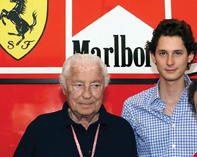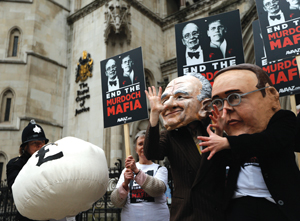When familial ties force a young next-gen into leadership

Picking a chief executive for any family business is a tough task. It is especially problematic if the company is bent on keeping a family member in the top job. This was the conundrum Gianni Agnelli faced when trying to prepare an heir to take the wheel of his family’s iconic Italian car brand Fiat. Drug addiction in his only son and then stomach cancer in his nephew saw his pool of potential successors whittled down to his 21-year-old grandson John Elkann.
Appointed to the Fiat board in 1997, Elkann was given a hurried apprenticeship in the inner workings of the business – he had only six years under the tutelage of his grandfather before the long-time family business leader died in 2003. But Agnelli’s son, Edoardo, was quick to express his contempt for the succession plan. In an interview with an Italian newspaper he likened his father’s decision to that of the mad Roman emperor Caligula appointing his horse as a senator. The troubled Edoardo killed himself in 2000.
 The news of the appointment of a young, family chief executive is often greeted with similar scepticism from the public and media and youthful family business leaders face a double standard when compared to their non-family counterparts. Take, for instance, the adulation heaped on 38-year-old Yahoo chief Marissa Mayer who topped Fortune’s 40 Under 40 list last year for shaking up the ailing former tech giant. Contrast this with how Elkann’s meteoric rise continues to be viewed with suspicion, despite the family empire moving from strength to strength under his leadership.
The news of the appointment of a young, family chief executive is often greeted with similar scepticism from the public and media and youthful family business leaders face a double standard when compared to their non-family counterparts. Take, for instance, the adulation heaped on 38-year-old Yahoo chief Marissa Mayer who topped Fortune’s 40 Under 40 list last year for shaking up the ailing former tech giant. Contrast this with how Elkann’s meteoric rise continues to be viewed with suspicion, despite the family empire moving from strength to strength under his leadership.
“People are quicker to judge family successors and question the process of appointment and their credibility. A non-family chief executive wouldn’t get the role unless it was purely on merit so it avoids the speculation around nepotism,” says family business consultant Juliette Johnson. She adds: “These feelings are often based more on assumptions than fact, which can be both unfair on the individual and damaging for the business.”
The internet has given the public much easier access to corporate information and the senior management of famous brands are now more visible. In some cases, for example the late Steve Jobs at Apple, a charismatic leader can become a brand’s greatest marketing tool. Like it or not, a chief executive’s credentials are now central to a company’s reputation and can influence consumers’ buying habits. A 2012 study by international public relations firm Weber Shandwick found 66% of consumers said their opinion of top leadership impacted their overall view of a company to a great or moderate degree. If consumers conclude a leader is in the top job because of blood rather than talent, it has a negative impact on a business’s reputation. However, according to Johnson, young heirs face a pretty tough job when it comes to proving their worth.
“People look in from the outside and make judgments without knowing any of the facts. They automatically assume that if your name is above the door then you’ve had an unfair advantage – which in many cases is unfair and unjustified. I know lots of family businesses that are overly tough on their next generation and raise the bar really high around what is expected from them if they’re involved in the business,” she says.
A family member’s suitability for the chief executive role may extend beyond the work experience detailed on their curriculum vitae. Many next gens have spent school holidays completing work experience at the business and been privy to dinnertime conversations about the running of the family firm.
 Kathleen Thurmond (pictured, left), now a business consultant with advisory firm Wealth Legacy Group, has first-hand experience dealing with double standards. She was actually 42 years old when she took over her family’s US-based uniform rental and industrial laundry business Best Washington Uniform Supply (which has since been sold) after the death of her father, but her appointment was still met with cynicism from her peers. She remembers a leader of a rival business remarking: “What’s a young thing like you doing coming into this industrial, men’s business?” A particularly galling comment considering Thurmond had run an aids hospice programme and had a wider background in healthcare.
Kathleen Thurmond (pictured, left), now a business consultant with advisory firm Wealth Legacy Group, has first-hand experience dealing with double standards. She was actually 42 years old when she took over her family’s US-based uniform rental and industrial laundry business Best Washington Uniform Supply (which has since been sold) after the death of her father, but her appointment was still met with cynicism from her peers. She remembers a leader of a rival business remarking: “What’s a young thing like you doing coming into this industrial, men’s business?” A particularly galling comment considering Thurmond had run an aids hospice programme and had a wider background in healthcare.
“There’s an assumption made that you’re here because you’re part of the family and people don’t always look beyond that to see that maybe this person has some experience,” she says. “But people don’t see that, they think – not just in my case but in the case of many young people – you’re just here because of family and I’m just going to make the assumption that you really don’t have the skills.”
Despite such criticism, what young chief executives lack in experience they can make up for with creativity and willingness to take a chance on an opportunity. In an interview with The Wall Street Journal for an article about young CEOs, entrepreneurial next-gen Michael Reger said one of his greatest advantages when he cofounded Northern Oil & Gas in 2006, aged 30, was his lack of fear, having “never been busted before by the oil cycle”. The company invested in a North Dakota and Montana formation, then on the fringes of the world oil industry, which soared in following years due to new extraction technologies. Reger’s father, who had seen the family mineral business flattened during the oil bust of the 1980s, said the investment was “too risky for us old-timers”.
Thurmond was careful not to assume she knew it all, despite her track record outside the family business. Both she and Johnson think one of the worst things a family business can do is to appear to have left an unsupervised novice in charge. It is rare that a board would want to select an unproven leader, and it is often a tragedy that forces the issue. Thurmond thinks it is important that it is clear to all stakeholders that the new leader’s education is ongoing to restore their confidence.
Thurmond joined a group of 20 family businesses, all operating similar businesses to her own, which met every other month to host discussions or listen to guest speakers who specialised in their industry or business in general. They also set up a comprehensive peer review system to assess each others’ businesses and offer advice and support.
“We would come in with a checklist and we would critique each other in a variety of areas that we felt were important. At the end of the meeting you would receive that critique, so for example ‘Kathleen, you really need to look at your production flow’ or ‘your accounting system needs to be upgraded – that would really expedite things and make you more accurate’. The other thing that we did was compare financials, so if my percentage of labour was higher than somebody else’s I needed to understand exactly why that was, so it was immensely helpful,” she explains.
 Finding the new chief executive a co-pilot for the first few years of their tenure is another effective option. After the death of his grandfather, John Elkann was appointed vice-chairman for four years before acceding to the role Agnelli had planned for him – it gave him the chance to be deeply involved in the restructuring of the debt-ridden group that took place after Agnelli’s death without being the executive decision maker. Axel Dumas (pictured, right), 43, head of French luxury house Hermès, underwent a similar four-year apprenticeship, acting as co-chief executive with non-family member Patrick Thomas before taking sole control this year. Dumas had the benefit of Thomas’s experience during the LVMH scandal, when Bernard Arnault’s luxury goods juggernaut secretly built up a stake of more than 20% in the business, threatening the family’s control.
Finding the new chief executive a co-pilot for the first few years of their tenure is another effective option. After the death of his grandfather, John Elkann was appointed vice-chairman for four years before acceding to the role Agnelli had planned for him – it gave him the chance to be deeply involved in the restructuring of the debt-ridden group that took place after Agnelli’s death without being the executive decision maker. Axel Dumas (pictured, right), 43, head of French luxury house Hermès, underwent a similar four-year apprenticeship, acting as co-chief executive with non-family member Patrick Thomas before taking sole control this year. Dumas had the benefit of Thomas’s experience during the LVMH scandal, when Bernard Arnault’s luxury goods juggernaut secretly built up a stake of more than 20% in the business, threatening the family’s control.
A shortage of possible leaders in a family business is the reason many young chief executives find themselves in the top job, and it’s also the same reason it is very hard to get rid of them if they make a mistake. If a public company finds itself embroiled in a scandal, publicly sacking the leader is one of the quickest ways to make amends to consumers, even if this figure was far removed from any incident that may have caused the reputation crisis. Family businesses don’t have that easy atonement mechanism, and can have a much more difficult time restoring the public’s faith in their company. Replacing a young leader is rarely an option, because there usually isn’t an alternative family member to take the reins.
James Murdoch knows a thing or two about making very public mistakes. He rose rapidly through the ranks of his father Rupert’s media empire – even becoming the youngest ever chief executive of a FTSE 100 listed company when he took the senior role at pay-to-view broadcaster BSkyB aged just 30. In 2011, however, his star came crashing down when the News of the World phone hacking affair rocked the UK’s media industry.
 It was revealed News of the World journalists had hacked the phones of celebrities, journalists and even the families of murder victims all in the name of a good scoop. James’ perceived lack of action only added to the outrage, and what followed for him in the next nine months was a series of resignations. First as chairman of News Group Newspapers, then as the executive chairman of News International, News Corp’s British newspaper arm, and then, in April 2012, as chief executive of BSkyB. The British public, however, didn’t quite get the blood it desired, as James was squirreled away into other divisions of News Corp, and was shielded from the full consequences of the scandal. Rupert had no intention of sacking the only son he had working in the business at the time.
It was revealed News of the World journalists had hacked the phones of celebrities, journalists and even the families of murder victims all in the name of a good scoop. James’ perceived lack of action only added to the outrage, and what followed for him in the next nine months was a series of resignations. First as chairman of News Group Newspapers, then as the executive chairman of News International, News Corp’s British newspaper arm, and then, in April 2012, as chief executive of BSkyB. The British public, however, didn’t quite get the blood it desired, as James was squirreled away into other divisions of News Corp, and was shielded from the full consequences of the scandal. Rupert had no intention of sacking the only son he had working in the business at the time.
Any chief executive can make a mistake, or find their company caught up in a scandal, but their age can add an extra layer to the problem. “I think assumptions are made, you know ‘they weren’t ready for this,’ rather than if it had been someone who was say 50, they might say ‘well, that person made a mistake or they really used bad judgement’ but they wouldn’t say, ‘they’re just inexperienced,’ so people tend to make assumptions and create stereotypes that are false,” says Thurmond.
Rupert was in an unenviable situation, and the stains on his company’s reputation may never come out. But Amber Melville-Brown, a media specialist with legal firm Withers Worldwide, thinks that a scandal, if handled properly, can actually enhance a family business’s standing in the long-term.
“It is vital to maintaining confidence to consider the options carefully and thoroughly rather than making a hasty, knee jerk response. The public, rightly, respects honesty and will tolerate mistakes when real regret is evidenced. Investors will be less worried by a public mistake where there is a clear vision shown as to how the issue will be prevented from arising in the future,” she says.
Melville-Brown adds that reputations can never be “washed” by these actions, but adds dealing with the problems head on and maintaining a stream of communication with the public that expresses regret for the past and confidence for the future can be more helpful than immediately sacking the senior management. “The very strength of a family business can be in its tight knit family and the standards and values it espouses,” she points out, something that would be lost if the board bowed to public pressure and sacked a young leader.
It was recently announced that both James and his elder brother Lachlan had been promoted to senior roles within their father’s business. Lachlan, who quit the businesses in 2005 because he felt undermined by his father, is now heir apparent once more. They are still in their early 40s – well below 53, which is the average age of chief executives for publicly traded companies. Lachlan was promoted to co-chairman of both News Corp and 21st Century Fox, while James became co-chief operating officer of 21st Century Fox. Note the “co” in their titles: their father has taken care to limit their executive power, perhaps because he thinks they aren’t yet ready to fly solo.
As for Elkann, his grandfather’s hunch seems to have been well founded (Agnelli himself was only 22 when he was appointed to the board at the family empire). Still only 38, Elkann is now chairman of Exor, the family’s holding company, and has overseen the company’s transformation into a global force in the automobile industry with the recent acquisition of Chrysler. It hasn’t been easy. Italy’s ongoing economic and political instability has forced him to look elsewhere for growth, and factory closures and redundancies have cost him some popularity in Fiat’s home country. But, the business is now well out of the danger zone it was in when he inherited it, and he was recently named one of the most influential chairmen under 40 by Fortune magazine – not bad for Caligula’s horse.
TOP TIPS FOR YOUNG FAMILY CEOs
Publish your credentials
Many next-gens have grown up immersed in the family businesses and know its company ethos and values better than anyone else. Many have to follow a strict development programme mandated by the business before they can join, such as getting a relevant degree or at least five years in an external company.
Find a mentor or co-chief executive
This system has been used to great effect by many well-known family businesses, and having a clear development programme for the new leader can help get the buy in of all stakeholders according to family business adviser Juliette Johnson.
Join or create a network of peers
Kathleen Thurmond was able to join a network of leaders in her industry, but she says a network of female CEOs, or a young leaders’ network would be equally useful. She says it was the thing she found most helpful in the early years of running her business. Networks of businesswomen running their family companies have become very popular in the Middle East.
Watch your mouth
John Elkann recently blotted his copybook by declaring Italy’s youth didn’t want to look for opportunities, despite having made wholesale redundancies at Fiat. “A new CEO needs to be prepared to be under the spotlight – both from traditional media and now also from social media and citizen journalists. Having a strong team behind him or her, with experience of confidently answering questions, and knowing when not to do so, can be invaluable,” says media law expert Amber Melville-Brown.
Come clean and say sorry
Mistakes and scandals can happen, and if they do, in lieu of sacking the leader, Thurmond thinks there is nothing more effective than an old fashioned apology – as long as it is accompanied by a clear plan of how things will be changed. “It’s really saying, ‘look, we realise we made an error of judgement here and we’re going to rectify that immediately and this is how we’re going to do it’ – whether that’s to the staff or the community at large,” says Thurmond.






